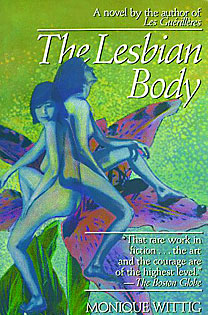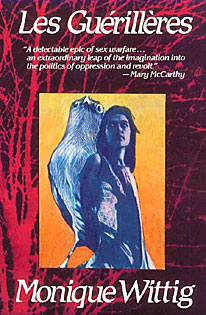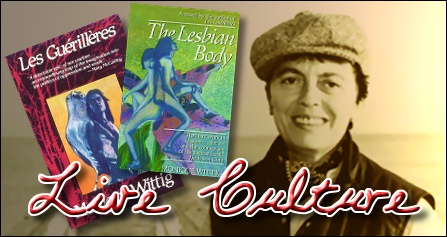By Jessica Suarez
Arizona Daily Wildcat
Tuesday January 28, 2003
She enjoyed talking walks in the desert wash behind her house or in Sabino Canyon, either with other professors or alone. She loved animals, especially spotting them during her walks. She didn't like to be photographed. She loved good meals accompanied with a good white wine. She was uneager to talk about herself, preferring instead to argue passionately about the writing of others. It is perhaps this uneagerness to talk about herself that made UA professor Monique Wittig's death go largely unnoticed in the city she had made her home for the last decade. But her death resonated loudly with those who were familiar with her essays and novels; both here and around the world. Her obituary was written up in the Associated Press, the New York Times, and the L.A. Times, among other publications.
Wittig died on Jan. 3, 2003 of a heart attack. She is survived by her partner, Sande Zieg, as well as her mother and niece. She was 67 years old.
Her ideas heavily influenced the fields of women's studies and gender studies. Wittig's work sought to get rid of the universal pronoun, "he," and to create a universal pronoun, neither male nor female.
"The biggest thing to understand is that, certainly in all her work, is that they are all about subjectivity," said Julia BalÄn, associate director of the women's studies department where Wittig was a professor.

 |
|
|
Two of Wittig's more well-known books, "The Lesbian Body" and "Les GuÄrilleres "
|
|
For BalÄn, and for Wittig's other colleagues in the university's women's studies and French departments, her sudden death was a shock to those who found her as passionate now as she ever was about the subjects she cared most about: gender and language.
"On Christmas Eve, she was in her usual feisty form, and wanted to discuss the limitations of Karl Marx and Michel Foucault relative to women," said Sandy Soto, a professor of women's studies. "What gets me through those moments when I feel most devastated by her death, is holding on to all the conversations we had over those long dinners, and remember how much she gave to me and to other people."
Wittig was born on July 13, 1935, in France. She was educated at the Sorbonne and at the âcole des Hautes âtudes en Sciences Sociales in Paris, where she earned a doctorate in languages.
Her first novel, "L'Opoponax" won the prestigious French literature award, the Prix Medici. The novel is about childhood, but the narrative is presented in a way that makes the reader feel as if they are experiencing the things in the novel for themselves. Wittig's careful attention to language accounted for this ¸ using the second person singular forms to evoke this feeling, as well as present tense verbs to recreate the way children view the world. The English translation was less precise, but the meaning was not lost on its readers, as a copy at the UA library shows. Every personal pronoun was hand-changed from "he or she" to "one" or "you" by a reader.
This change reflects what Wittig hoped to accomplish in her writings.
"She created a lesbian subject position. It's neither male nor female, so it is ultimately universal," BalÄn said.
Her second novel, "Les GuÄrillĆres," was more controversial. In it, women leave society and fight men in order to make a fresh, original beginning for themselves. These women were, like the Amazons, mythical warriors, designed to show women they could create their own history.
"The Straight Mind and Other Essays" was where Wittig explicitly laid out her philosophy, written in English. The essays cover many topics, including the role of language in creating gender roles. Wittig found no separation between these words like "man" and "woman" and their meanings, between the signifier and what was signified. Thus, she called for a total abandonment of the word "woman," declaring that lesbians were not women, because the word itself was sexist.
"The Lesbian Body" explored the connections between words and their meaning. This work broke down a love affair to its flesh and blood. Lovers show desire not just for their partner's body, but for her skin, veins, muscles and bones.
"It was about reclaiming the full range of subjectivity via the horrors and brutality that have been the history of women," BalÄn said.
That novel, like her others, showed how Wittig could seamlessly blend poetry, prose and theory in one work. She had also co-written "Lesbian Peoples: Materials for a Dictionary" with her partner Zieg, and also staged a play, among other books and essays.
Her last major project was turning her short story into a feature film, titled, "The Girl." The film, a lesbian noir set in Paris, was released in 2001.
Her work was praised by other French writers like Simone de Beauvoir, Marguerite Duras, and Nathalie Sarraute. She was also one of the founding members, along with de Beauvoir, of the Feministes Revolutionnaires, a French feminist group famous for placing a wreath for "the unknown female soldier" at the Arc de Triomphe in Paris.
She broke with that group because she thought she was being pushed to the movement's margins by straight feminists.
"As (Wittig) put it, she was in ╬exile,'" BalÄn said. "There was a resistance to lesbianism in the French feminist movement."
Wittig was also a materialist feminist, a feminist who concerns him or herself with the material condition of women, BalÄn said. Wittig's primary goal as a materialist feminist was to eliminate the subordination of women in language.
"She was unimpressed with many strands of feminism. She felt they did not go far enough in their analyses of sexism and homophobia," Soto said. "Unlike many feminist theorists, Monique believed that the only way to make effective change for women was to completely deconstruct sex and gender as categories. She didn't want to celebrate women as women, but to consider how to make the category ╬woman' disappear, along with the category ╬man.'
After leaving France and taking up several temporary teaching positions at universities in the United States, Wittig decided to teach at the UA on the recommendation of Sarraute. It was recommended to her as a place where she could write and be outdoors.
She received positions in both the women's studies and the French departments, where she taught classes at both the undergraduate and graduate levels. She was convinced to teach, reluctantly, a class on her own work, called "Wittig on Wittig," which Professor Robert Ariew recalls she said was the hardest class she ever taught.
"I can't imagine any graduate student in literature not being aware of Monique's work, I don't know of any anthology of modern French literature that does not mention her name in the context of feminism or the women's movement," said Ariew, a professor of French.
Many of her collegues had strong personal friendships with her, and many remember taking walks with her through Sabino Canyon or discussing literature with her over a meal.
"She and I had many long discussions about literature in general, about how to teach literature, about aesthetics, but she stayed away from discussing her work specifically," Ariew said. "She much preferred to talk about nature, about sunsets in Sabino Canyon, the yellow, orange, red, and purple lights, the dance of humming birds and the song of the different birds."
Wittig's body of work could have scared some students. It was intimidating to be taught by someone about whom classes are taught. Students who got to know her, however, like Lydia Hallay, found Wittig to be more interested in learning about their work than talking about her own.
"I think the people who were intimidated by Wittig were those who had never met her, or who had come into brief contact with her and thought she was bristly or eccentric. She was actually pretty unassuming. Down to earth, kind and approachable," said Hallay, who took one of Wittig's classes last spring.
"(Wittig) was always horrified when someone used the word, ╬vagina.' She'd say, in a thick French accent, ╬But vagina is sheath for a sword in Latin!' She couldn't believe the ╬Vagina Monologues' phenomenon.
"She didn't believe that radical change could ever be achieved by containing the revolutionary argument in the purview of a minority group," Soto said.
Wittig wrote about women and lesbians, but not just for women and lesbians. Though her work received the most recognition in the context of women's and gay and lesbian studies, she believed her work applied to everyone.
"She thought of herself as a writer, period, and that there was no such thing as ╬women's writing,' said Professor of Media Arts Beverly Seckinger, a friend of Wittig. "She abhorred such essentialist notions, and her conviction was that fiction must speak to a universal human audience."
Though her writing was what brought her fame, Wittig's collegues remember her most as a person more eager to listen to others than to talk about herself.
"She was my dearest friend, both on and off campus. She cared about me dearly," BalÄn said. "I will always miss that."
The women's studies department is planning a memorial for Wittig sometime in February. The department has also set up a scholarship in her name. Contact the women's studies department for more information at 621-7338.


